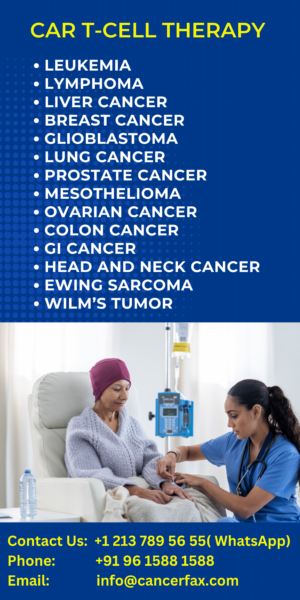Burkitt’s lymphoma
What is Burkitt’s lymphoma?
Burkitt lymphoma is a rare B-cell non-Hodgkin lymphoma that is extremely aggressive (fast-growing) (NHL). The jaw, central nervous system, gut, kidneys, ovaries, and other organs may be affected by this condition. Burkitt lymphoma can spread to the brain and spinal cord (CNS).
Burkitt lymphoma is characterised by a translocation (a form of rearrangement) of a gene called MYC, making this a crucial finding for diagnosis. Burkitt lymphoma is commonly confused with diffuse large B-cell lymphoma (DLBCL), another severe B-cell lymphoma in adults. Because Burkitt lymphoma and DLBCL are treated differently, an accurate diagnosis of Burkitt lymphoma is crucial. As a result, it is strongly advised that patients seek the advice of a lymphoma expert.
Types of Burkitt lymphoma
Endemic Burkitt lymphoma
Burkitt lymphoma is a type of lymphoma that is only found in Africa. It is the most prevalent kind of Burkitt lymphoma, as well as the most common malignancy in children. It is 50 times more common in equatorial Africa and New Guinea than in the United States. The jaw is the most common site of endemic illness. The endemic form of Burkitt lymphoma has been linked to Epstein-Barr virus (EBV).
Sporadic Burkitt lymphoma
Sporadic Burkitt lymphoma is a type of lymphoma that can be found anywhere on the planet. This kind of B-cell NHL is seen in fewer than 1% of adult B-cell NHLs, but it accounts for 30% of all juvenile lymphomas in the United States and Western Europe. The most prevalent site of disease development is an abdominal tumour.
Immunodeficiency-related Burkitt lymphoma
Immunodeficiency-related Burkitt lymphoma subtype is most common in patients who have the human immunodeficiency virus/acquired immunodeficiency syndrome (HIV/AIDS). Patients with hereditary immune weaknesses or those who take immunosuppressive medicines to prevent rejection after an organ transplant are also at risk.
Symptoms of Burkitt’s lymphoma
The symptoms of sporadic Burkitt’s lymphoma include:
- abdominal swelling
- distortion of facial bones
- night sweats
- intestinal obstruction
- an enlarged thyroid
- enlarged tonsils
Diagnosis of Burkitt’s lymphoma
A medical history and physical examination are used to diagnose Burkitt’s lymphoma. The diagnosis is confirmed by a tumour biopsy. The central nervous system and bone marrow are frequently involved. The cancer’s spread is usually determined by examining the bone marrow and spinal fluid.
Burkitt’s lymphoma is classified into stages based on the lymph node and organ involvement. Stage 4 is defined by the involvement of bone marrow or the central nervous system. A CT or MRI scan can be used to determine which organs and lymph nodes are implicated.
Treatment of Burkitt’s lymphoma
Burkitt’s lymphoma is usually treated with combination chemotherapy. Chemotherapy agents used in the treatment of Burkitt’s lymphoma include:
- cytarabine
- cyclophosphamide
- doxorubicin
- vincristine
- methotrexate
- etoposide
Rituximab, a monoclonal antibody, can be used in conjunction with chemotherapy. Chemotherapy can potentially be combined with radiation therapy.
To keep the cancer from spreading to the central nervous system, chemotherapy medications are injected directly into the spinal fluid. The term “intrathecal” refers to this type of injection. The best outcomes have been linked to people who receive intense chemotherapy treatment.
Treatment is often less rigorous and successful in nations with low medical resources.
Burkitt’s lymphoma patients have been demonstrated to have the best prognosis.
The presence of an obstruction in the intestine necessitates surgery.
Take second opinion on Burkitt's lymphoma treatment
- Comments Closed
- September 8th, 2021



Latest Posts
- Targeting FGFR4 and CD276 with CAR T-cells demonstrates a strong antitumor impact against children rhabdomyosarcoma
- Disruption of CD5 on CAR T Cells Enhances the Effectiveness of Anti-Tumor Treatment
- The future of gene therapy: What to expect in the next decade?
- Unlocking the genetic code: The future of gene therapy for genetic disorders
- CRISPR and gene editing: Revolutionizing gene therapy
- Aids cancer (4)
- Anal cancer (8)
- Anemia (5)
- Appendix cancer (3)
- Basal cell carcinoma (1)
- Bile duct cancer (7)
- Bladder cancer (10)
- Blog (3)
- Blood cancer (56)
- Bone cancer (11)
- Bone marrow transplant (43)
- Brain Tumor (48)
- Breast Cancer (48)
- Cancer (787)
- Cancer surgery (234)
- Cancer treatment in South Korea (341)
- cancer treatment in Thailand (331)
- Cancer treatment in Turkey (329)
- Cancer treatment in USA (328)
- CAR NK-Cell therapy (12)
- CAR T-Cell therapy (95)
- Cervical cancer (41)
- Chemotherapy (36)
- Childhood cancer (2)
- Cholangiocarcinoma (3)
- Clinical trials (5)
- Colon cancer (95)
- Coronavirus (1)
- Cosmetic surgery (7)
- COVID19 (2)
- Doctor (37)
- Drugs (19)
- Endometrial cancer (9)
- Esophageal cancer (15)
- Eye cancer (9)
- Gall bladder cancer (3)
- Gastric cancer (22)
- Glioblastoma (1)
- Gynecological cancer (2)
- Head and neck cancer (20)
- Hematological Disorders (50)
- Hospital (47)
- Immunotherapy (25)
- Kidney cancer (10)
- Laryngeal cancer (1)
- Leukemia (44)
- Liver cancer (94)
- Lung cancer (65)
- Lymphoma (44)
- MDS (2)
- Medical tourism (71)
- Medical visa (11)
- Melanoma (8)
- Merkel cell carcinoma (1)
- Mesothelioma (4)
- Myeloma (22)
- Oral cancer (13)
- Ovarian Cancer (13)
- Pancreatic cancer (39)
- Penile cancer (1)
- Procedure (19)
- Prostrate cancer (10)
- Proton therapy (26)
- Radiotherapy (35)
- Rectal cancer (57)
- Sarcoma (11)
- Skin Cancer (13)
- Spine surgery (8)
- Stomach cancer (40)
- Surgery (54)
- Systemic mastocytosis (1)
- T Cell immunotherapy (2)
- T-Cell therapy (7)
- Testicular cancer (5)
- Thoracic surgery (2)
- Throat cancer (6)
- Thyroid Cancer (14)
- Treatment (746)
- Treatment in China (646)
- Treatment in India (684)
- Treatment in Israel (586)
- Treatment in Malaysia (360)
- Treatment in Singapore (255)
- Treatment in South Korea (238)
- Treatment in Thailand (233)
- Treatment in Turkey (233)
- Uncategorized (39)
- Urethral cancer (9)
- Urosurgery (14)
- Uterine cancer (3)
- Vaginal cancer (6)
- Vascular cancer (5)
- Vulvar cancer (1)






Privacy Overview